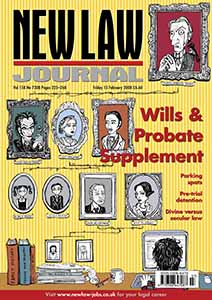
Employment Rights (Increase of Limits) Order 2007 (SI 2007/3570)
R v Y [2008] EWCA Crim 10, [2008] All ER (D) 199 (Jan)
R (on the application of Walker) v Secretary of State for Justice; R (on the application of James) v Secretary of State for Justice [2008] EWCA Civ 30, [2008] All ER (D) 15 (Feb)
Re Trinity Mirror Plc and others (A and B (Minors, acting by the Official Solicitor to the Supreme Court) Intervening) [2008] EWCA Crim 50, [2008] All ER (D) 12 (Feb)
R v Yam [2008] All ER (D) 212 (Jan)
R (on the application of Torres) v Commissioner of Police for the Metropolis [2007] EWHC 3212 (Admin), [2007] All ER (D) 234 (Dec)
Paul Sharpe bemoans the lack of regulation in willwriting
Second home owners are not well served by capital gains tax legislation, says Michael Waterworth
Legal Aid
Are Criminal Records Bureau checks too onerous? asks Helen Hart
MOVERS & SHAKERS

NLJ Career Profile: Ken Fowlie, Stowe Family Law
Ken Fowlie, chairman of Stowe Family Law, reflects on more than 30 years in legal services after ‘falling into law’

Gardner Leader—Michelle Morgan & Catherine Morris
Regional law firm expands employment team with partner and senior associate hires

Freeths—Carly Harwood & Tom Newton
Nottinghamtrusts, estates and tax team welcomes two senior associates







